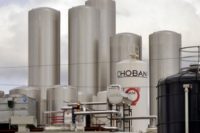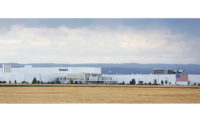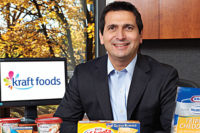In his hit song “American Saturday Night,” country singer Brad Paisley celebrates immigrants’ contributions to American culture, including pizza with Canadian bacon, beer from the Netherlands, Brazilian leather, German cars and the Beatles, not to mention “a French kiss, Italian ice and margaritas in the moonlight.”
A dairy version of this only-in-America story features a Turkish immigrant entrepreneur building a Greek yogurt empire with milk sourced from U.S. dairy farmers in New York state. Hamdi Ulukaya’s Chobani Yogurt has shot to the top of the category and become a national (and international favorite) in only five years. That is a big, big deal.
Dairy Foods selected Chobani, based in Norwich, N.Y., as the 2012 Processor of the year for the following reasons:
• Market leadership position
• New product development
• Marketing initiatives
• Plant expansion
• Community involvement
Hamdi Ulukaya, who emigrated from Turkey in 1995, started the Chobani company in 2005. With a Small Business Administration 504 loan, he bought a shuttered dairy processing facility from Kraft Foods in upstate New York and began making authentic strained Greek yogurt. (“Chobani” means “shepherd” in Mediterranean languages, a symbol of one who gives without expecting anything in return.)
As the SBA noted when it honored Ulukaya with its Entrepreneurial Success award in May, he started with a 100-year-old plant and a staff of five. He spent almost 18 months perfecting the recipe and in 2007 the first cup of yogurt hit the shelves. By 2008 the company had grown to 83 employees, with sales of $22.9 million. Now, with more than 1,700 employees, Chobani is shipping nearly 2 million cases every week.
Chobani wasn’t the first processor to sell the high-protein Greek yogurt in the United States, but it certainly owns the market. By 2011, the Chicago-based market research firm SymphonyIRI Group named Chobani the leading yogurt brand in the United States, with a reported 18.6% market share. A writer for Forbes called Ulukaya “the Steve Jobs of yogurt” and Chobani “the Apple of Greek yogurt.” The privately held company does not release annual sales, but they have been estimated to be close to $1 billion.
The yogurt is so popular that, at times, Chobani has had to put some of its retail customers on allocation. To accommodate demand and growth, the New Berlin, N.Y., facility is being expanded and a new plant in Idaho is under construction. Chobani broke ground in Twin Falls, Idaho, in December 2011. The nearly $450 million high-capacity facility on 200 acres is in the state’s so-called “Magic Valley.” The plant, expected to create up to 400 jobs, is scheduled to be operational by the end of this year.
“We’ve just about reached the upper limit on milk capacity in New York state, so we’re really excited about our new plant in Twin Falls, Idaho, to tap into a new supply,” said Kyle O’Brien, executive vice president of sales.
Ulukaya said the company’s search committee visited numerous possible sites and “met a lot of great people along the way. It was a hard decision to make, but in the end, we chose Twin Falls due to its abundant milk supply, skilled labor force and tight-knit local community.”
Idaho Governor C.L. “Butch” Otter said Chobani’s planned investment should result in an additional $200 million in regional sales. “Between construction activities, employment at the plant and the sourcing of local supplies like milk, there’s no question that the economic effect of Chobani’s new site will run deep throughout Southern Idaho, benefiting family farms as well as our dairy and construction industries,” Otter said in a statement at the time of the groundbreaking.
Another significant move this year was the opening of a 5,200-square-foot sales headquarters in Charlotte, N.C. O’Brien said he expected to increase the sales force to 60 positions from 17. Jobs include direct sales, retail analysts and trade marketing sales support.












